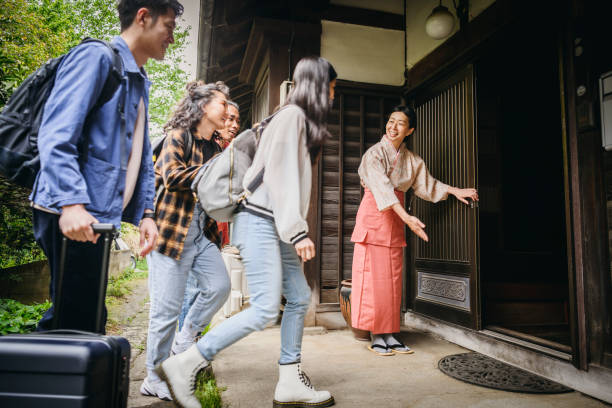
Cultural Etiquette 101: What to Know Before Visiting Japan
Traveling to a new country is an exciting adventure, but it’s essential to understand the local customs and traditions to ensure a respectful and enriching experience. Japan, a nation steeped in history, culture, and respect for traditions, can be an eye-opening destination for any traveler. However, failing to adhere to Japan’s cultural etiquette may lead to misunderstandings or awkward situations. In this guide, we’ll explore essential do’s and don’ts for travelers in Japan, covering greetings, dining, tipping, and behavior in public spaces.
1. Greetings and Personal Interaction
Japan places great emphasis on manners and respect, and this is evident in the way people greet one another.
Do:
- Bow: A bow is the traditional greeting in Japan. It shows respect and humility. The depth of the bow indicates the level of respect, with a slight bow for casual encounters and a deeper one for formal situations. If you’re unsure, a gentle nod will suffice.
- Use honorifics: Japanese people often use honorific titles such as “san” after a person’s name (e.g., Tanaka-san). It is respectful and polite to do the same.
- Handshake with caution: While handshakes have become more common, they are not as prevalent as in Western cultures. If you do shake hands, keep it light and respectful.
Don’t:
- Avoid direct physical contact: Japan has a conservative approach to personal space, and public displays of affection (like hugging or kissing) are uncommon and considered inappropriate.
- Don’t use first names casually: In Japan, it’s considered impolite to call someone by their first name unless you are very close. Always use the appropriate honorific.
2. Dining Etiquette
Japan has a rich food culture, and dining is a significant part of social interaction. Knowing the proper etiquette can enhance your experience and help you avoid inadvertently offending someone.
Do:
- Say “Itadakimasu” and “Gochisousama deshita”: Before eating, say “Itadakimasu” (a phrase that expresses gratitude for the meal), and after finishing, say “Gochisousama deshita” (thank you for the meal).
- Use chopsticks correctly: Don’t stick chopsticks upright into a bowl of rice, as this resembles a funeral ritual. Avoid passing food directly from one pair of chopsticks to another, as this too is linked to funeral customs. Instead, place food on someone else’s plate using your chopsticks.
- Slurp your noodles: In Japan, it’s perfectly acceptable to slurp your noodles, as it’s considered a way to enjoy the meal and enhances the flavor.
Don’t:
- Don’t point your chopsticks at others: Pointing at someone with your chopsticks is considered rude. Also, don’t use them to gesture or tap on dishes.
- Avoid tipping: Tipping is not a part of Japanese culture. In fact, it can be seen as disrespectful. Excellent service is expected as part of the job, so you won’t need to leave a tip.
3. Tipping Culture
Unlike in many Western countries, Japan has a unique approach to tipping. It is simply not done. Service charges are usually included in the cost, and staff are paid a salary rather than relying on tips for income.
Do:
- Show appreciation verbally: If you want to show appreciation, a polite “arigatou gozaimasu” (thank you very much) is always appreciated.
Don’t:
- Don’t tip at restaurants, taxis, or hotels: Attempting to leave a tip might confuse or embarrass the staff. Japanese culture places more value on humility and service than monetary rewards for good service.
4. Behavior in Public Spaces
Japan is known for its cleanliness, orderliness, and respect for others in public spaces. To blend in and avoid any unintentional rudeness, it’s important to understand how to behave in public.
Do:
- Maintain quietness in public spaces: Japanese society values silence, particularly in public places like trains or buses. Keep conversations at a low volume, and always set your phone to silent mode.
- Queue properly: Japanese people take queuing very seriously. Whether at train stations or elevators, always stand in line and wait your turn. Cutting in line is a big no-no.
- Dispose of your trash responsibly: Public trash bins are rare in Japan. Bring your trash with you or find a designated area for disposal.
Don’t:
- Don’t point: Pointing at people or things is generally considered impolite in Japan. If you need to gesture, use your whole hand and be subtle.
- Avoid talking on the phone in public places: In most public spaces, especially on public transport, it’s frowned upon to speak on the phone. Use your phone discreetly and only in designated areas.
5. Gift Giving
Gift-giving is a significant part of Japanese culture, and it’s a thoughtful gesture in many social situations.
Do:
- Present a gift with both hands: When giving a gift, it’s customary to offer it with both hands as a sign of respect.
- Wrap gifts elegantly: The presentation is just as important as the gift itself. Make sure the gift is wrapped neatly, as presentation reflects the care and effort you’ve put into the gesture.
Don’t:
- Avoid giving certain items as gifts: Avoid giving gifts like scissors, knives, or anything sharp, as these items symbolize cutting off relationships. Similarly, don’t give items in sets of four, as the number four is associated with death.
Final Thoughts
Understanding cultural norms and etiquette in Japan will not only help you avoid faux pas but also deepen your appreciation for this beautiful country. Whether you’re bowing to greet someone, using chopsticks correctly, or respecting the silence of a train ride, small gestures of respect can make a world of difference. By familiarizing yourself with Japan’s customs, you’ll show your respect for the local culture, making your visit more enjoyable and meaningful. Happy travels!

Leave a Reply